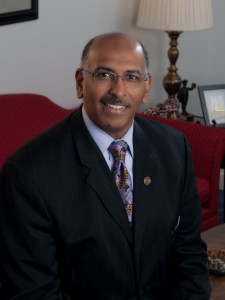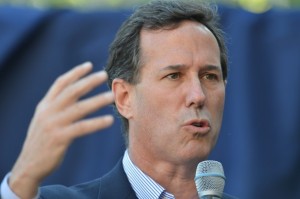[Click here to follow the entire RP Debate]
|
Having gotten lost in this thread long ago, I will re-enter only to make a few observations:
-If one’s perspective is that Mitt Romney’s opposition to gay marriage and his parting of ways with a staffer whose public position was at odds with his own both amount to homophobia or bigotry, there is not much room for civil debate. I would beg to differ, and would only urge that a topic on which the country seems almost evenly split deserves a less absolutist frame.
-On the larger question of relevance, I side with the Miller/Steele way of looking at this episode: too long ago, too hard to separate from the context of juvenile foolishness, too hard to invoke against Romney without setting a standard that would scorch too many others. I also found intriguing one line of comments to the effect that the whole business of background mining to determine character would have wreaked havoc with a lot of good presidencies. It’s not that character has nothing to tell us about the potential misuses of power, but that it requires much more depth of knowledge and much more texture than today’s weakly sourced media snapshots can generally provide. And surely there is some statute of limitations.
-As to the other nagging charge, that Romney’s handling of this episode is revealing of some lack of empathy, I plead confusion. Should he have really waxed eloquent about a thing that he likely barely remembers, and that he reasonably contends has not much to do with his current values? Should Barack Obama have shown more anguish in describing the costs of teenaged drug use, or George Bush more passion in describing the wages of alcoholism? I’ll side with whoever said that the passions of these candidates on where they plan to take the country are worth more than their passions about their life lessons.
-Final point: I’ll confess disappointment that no one has bothered to address the timing of the Washington Post story, especially on a blog where more than a few of us have been at the mercy of press selectiveness in our past political lives. Timing is a huge power in journalism and the choice to run this story the day it ran is hard to qualify as anything other than a hit job. It was a pretty-clear cut instance of a news organization trying hard to link a 48 year old account to a current position on an issue. That is advocacy, not balls and strikes journalism; fine for a Huffington Post blogger, not fine for the second political paper of record in the country.
I agree with Michael Steele’s assessment. (A sentence I had not anticipated writing since joining the RP blog. But well put, sir.) Some people like to drive slowly past an accident to see what happened. I hate to admit it, but I’m guilty of this more often than I wish I were. But I don’t want to be someone who drives by a fender bender and slows down to imagine an accident that I wish had happened but didn’t. I can’t help but feel that’s an appropriate analogy for Mr Romney’s alleged anti-gay bullying behavior. Even if it happened as provocatively as some have reported, I don’t feel the behavior is much more than pubescent pseudo-masculine posing. Embarrassing? Yes. Regrettable? Sure. Like a fender bender. But grounds for revocation of a license to be president, so to speak, 45 years later? I say we should take Michael Steele’s advice and keep driving. Something to see and note, perhaps, but nothing worth staring at for very long.
It’s amazing what you miss when you turn off the TV or stop reading the newspaper. But, unfortunately, since that’s not what I did this week, I’m stuck like the rest of you trying to put some rational context to an almost fifty year story about a bunch of preppy high school boys in the 1960s doing what all preppy high school boys do—haze the hell out of each other. And because one of those preppy high school boys is running for president we’re supposed to judge his actions to be more egregious, offensive and disqualifying because this happened in 1965? If the Washington Post broke the story that five weeks ago Mitt Romney and a bunch of aides wrestled an Obama supporter to the ground and Romney sat on his chest and started cutting his hair off, now that would be something worth reading (and seeing). But since that’s not what happened, this story like the incident itself bears no relevance to the man, his campaign for the presidency or what people think or feel about him (except maybe for a few old preppy high school boys who may think he’s cool—but not quite like “The Fonz”). Just like the most minor of fender benders that ties your life up in a knot of traffic because someone has to slow down and look—don’t look, don’t even pause. Just keep moving because there’s nothing going on here worth reading about or seeing.
The dog-on-the-roof-of-the-car story lost traction when the media discovered that the President had admitted to eating one. Thus, we now confront a story even more remote in time, which strives to raise implications which are certainly far more serious. Yet, before we venture too far into the subject of how relevant the reported incidents are as a guide to Mitt Romney’s character today, should we not first revisit the threshold question of how deeply the political process should scrutinize a candidate’s personal history? Will those who have stood (often justifiably) aggrieved at attempts to dig into Barack Obama’s past perform an about-face, now that the shoe seems to be on the other foot? I hope not.
It seems as though the media launched this seemingly perpetual cycle back in 1988, when for the first time (at least in my recollection) a presidential campaign imploded under the weight of personal issues. Granted, Gary Hart foolishly challenged the media to “follow him around . . . it will be boring.” I can also recall how Hart’s opponents justified the whole exercise upon as relevant to Hart’s fitness for the presidency, as it supposedly reflected upon his “judgment.”
Fast-forward to the 1991 Clarence Thomas confirmation hearings. The poisonous atmosphere that pervades judicial nominations today dates back to the 1987 Bork nomination, which turned not upon personal revelations, but upon positions that Bork had previously articulated. One could argue that Bork’s past writings were drawn out of context and should not have disqualified him for the Supreme Court (to me, serving as the henchman who finally carried out Nixon’s orders to fire Archibald Cox was far more troubling) – but it was hard to argue that those writings were not relevant. In 1991, however – without any other means to stop Thomas’ confirmation – opponents turned to Anita Hill’s sexual harassment allegations. What followed, of course, was a drawn-out media spectacle which amounted to a public trial without discovery, rules of evidence, or any of the other protections which our system supposedly provides to ensure a dispassionate search for the truth.
This show trial even seemed to involve new “law.” While Thomas denied Hill’s accusations in full, some of his supporters suggested a defense of consent – based upon the indefensible notion that just because Hill remained in Thomas’ employment, she had somehow endorsed the alleged behavior. Hill’s supporters responded that an employee-employer situation constitutes a “power relationship” wherein sexual harassment must be implied, regardless of the particular facts and circumstances. Moreover, members of the Senate Judiciary Committee came under attack for showing “insensitivity” toward Professor Hill; this issue played a prominent role in the following year’s Senate campaigns.
Given this backdrop, is President Clinton’s ordeal later that decade surprising in any respect? If we must automatically imply sexual harassment from the mere existence of a “power relationship” between Thomas and Hill, should we not have drawn an even stronger inference from circumstances involving a president and a intern in her 20s? Yet – without any sense of irony regarding what they had unleashed – Thomas’ accusers immediately became Clinton’s defenders. Presumed harassment melted back into “personal indiscretion,” providing a particularly troubling display of the old adage, “where you stand is where you sit.” This time, of course, a public show trial cross-pollinated with actual legal proceedings (the Paula Jones case).
While Jonathan has articulated a very principled, even-handed argument with which I agree in most all respects, I do take exception to one aspect of his position. In our legal system, entire lives can turn upon the weight of false testimony. Accordingly, perjury is never appropriate or acceptable. One can argue very persuasively that President Clinton’s false deposition testimony should have been addressed – if at all – within the legal system instead of Congress (which would likely have required waiting until the end of his presidency), but re-defining his conduct as merely “lying about personal indiscretions” takes us down a dangerous path. For example, the assumption that people will “naturally lie” about personal matters has transformed domestic relations proceedings in some courts into lawless free-for-alls in which perjury is condoned, if not expected (on the basis that people will “naturally lie” about personal matters).
We seem to live in a society bent upon creating illusions of perfection – not only regarding ourselves, but in connection with the leaders we choose. Seeking to maintain such illusions, we rely upon hyper-technical distinctions and highly-nuanced arguments that have the practical effect of adjusting our standards. It would seem far better to set our standards high and exercise common sense, compassion, and mercy when people fall short. Within the legal context, prosecutorial and judicial discretion exist for this very reason.
Of course, the heat and passion of politics inevitably ensures that the slightest flaw will get wildly blown out of proportion. If we try hard enough, we will find a way to connect that flaw to a candidate’s potential performance in office (in 1992, Ross Perot memorably suggested that Bill Clinton’s alleged infidelity was relevant because if his wife could not trust him, how could we?). Yet, the preservation of “government by the people” – or government by human beings – requires us to accept leaders with all-too-human frailties. Could FDR have passed the medical scrutiny John McCain endured four years ago? What about JFK’s “judgment” in sharing a mistress with mob boss Sam Giancana? Would we elect Lincoln today if we knew about the pervasive depression with which he struggled for most of his adult life? How would today’s political inquisitors handle reports that at the age of twelve, Adlai Stevenson accidentally shot and killed a childhood friend?
The bottom line – we simply cannot know enough about an individual’s private life to place what we learn about the same in the proper perspective. The only reliable information we possess is the public record. Sticking with the latter as we assess potential candidates is therefore not only just; it is sensible and practical.
We interrupt this fascinating and revealing debate with the uber-emotional rantings by this site’s founder. This debate has torn the scab off two pet peeves that have been the target of some of my most agonized rhetorical fury during my post-political recovery. First, with due respect to my friend, the Frozen Chosen Mr. Berkowitz — as well as dozens of columnists who’ve weighed in similarly over the past week — I am not persuaded at all that Romney’s reaction to the disclosure of events is troubling. In saying he didn’t remember the incident, I assume he lied. Any good lawyer or political consultant would have advised him to do the same. There was no advantage in him extending the debate by confirming or disputing the story, and no one can prove that he remembered it or not. I do not think Romney should be blamed for lying about an event that does not deserve punishment today, just as I don’t think Bill Clinton should have been impeached for lying about personal indiscretions, nor that my friend Jeff Smith should have been incarcerated for a year for falling into a perjury trap about a minor campaign finance violation. People lie because they are embarrassed, or because they don’t want to get bad publicity, but if what they lie about is not actionable in itself, I have trouble claiming that the lie is a major offense. Second, I dispute the notion shared by many of the previous contributors — as well, again, as by many pols and pundits this week — that we can draw some psychological conclusions about Romney’s performance as President based on something he did as a teenager. Of course, if a qualified therapist had Romney on the couch for a year’s worth of weekly sessions, and Romney shared his life story, the therapist could develop some meaningful conclusions about how Romney’s childhood shaped him in the decades that followed. But as any good therapist would tell you, they could not draw the same conclusions simply through reading a series of unrelated press accounts of his six decade life. Indeed, they would tell you: “This is not my patient; it would be irresponsible for me to draw such conclusions.” This is simply another excuse the press uses to pick apart the dirty laundry in a politician’s private life. This psychobabble does no service to the debate except selling papers and encouraging clicks from readers who love to revel in the misery of the famous, and/or who have been brainwashed by the movies and the media to expect full and consistent narratives about famous people. And by the way — this particular story matches no narrative of Mitt Romney, the candidate or human being, that I have ever read to date. The dominant narrative — one I have been inclined (brainwashed?) to accept as true — is that he is a politician who would do anything to get elected. In 1994, he was pro-gay in order to run against Ted Kennedy, and stayed pro-gay through his election as Governor of Massachusetts. By 2012 he became anti-gay to appeal to the right wing of his party. My guess he really doesn’t care much about the issue; his sole focus is on getting elected President. (And even that narrative is unfair. I am sure Romney cares about something — there are some ideas that he would never abandon for political expediency. There simply are no perfectly consistent narratives for us flawed human beings.) The fact that the 18 year old Romney was an asshole bully sheds no light on anything except the fact that when he was 18, he was an asshole bully. If I were his principal at the time, I would have expelled him and turned over the evidence to authorities to prosecute him for assault. (Of course, at that time — as well as in my own childhood — incidents like these were quite common and rarely punished severely: “Boys will be boys!” Replace “gay” with “Jew,” and I suffered a similar humiliation on a handful of occasions. Thank God today, society is moving in the direction of treating bullying as the crime that it is.) However, as I concluded in my introductory post, his stupid, mean, hurtful behavior as a teenager does not disqualify Mitt Romney to be President.
The failure to recollect the incident is astounding. His camp must be glad not to have to deal with a birth certificate question. And an apology as conditional as the one that was offered lacks the requisite sincerity. Short version is that the dubious response to a long ago boyhood incident is revealing about the man who would be president today.
I am in the camp that faults almost everything about this story: its timing–posting it the day after President Obama’s endorsement of gay marriage was a thinly veiled effort to link Romney’s opposition to a pattern of bigotry; its placement as a stand-alone piece when the details merited at best inclusion in a longer profile; its strained attempt at making nearly 50 year old events relevant; and its effort to exaggerate the perennial cruelties of adolescence into the systematic brand of bullying that we have become sensitized to today.
That a major newspaper got so many things so wrong is hard to justify as anything other than an agenda. Somewhere along the way, a major section of the press has absorbed the idea that Romney is a hollow kind of character without empathy or conviction, who has sold his soul to a hard-right clique in his party,and whose election would reverse the dawn of a new multi-cultural, tolerant America.
Having convinced itself that Romney is so flawed, much of that press has fed virtually every inspection of his record and past through such an unforgiving filter. The effect is that too much of the coverage of Romney looks exactly like the chain-letter attacks the DNC spits out every day.
Its one thing for a blogger or a columnist to develop a character thesis and dig away at it. Its another thing for an established press organ with a neutral face to go that route.
There is the conservative critique of Barack Obama that contends that he has grown the size and scope of government too much; then there is the liberal charge that he has moved to the middle and forfeited the progressive moment. The first is more true, the second more stinging to an administration that believes it is on the verge of breaking the political right. There is a third case, however, that is tied not to a theory of how big or small government should be but to the idea that a leader has obligations to speak with precision and clarity about the nature of the country’s burdens. By that elusive standard, the famously slippery Bill Clinton still fares well on an issue like welfare reform, where he reminded his base that an entitlement that penalizes work is a social disaster. Jimmy Carter, for that matter, deserves points for an energy policy that meant to cap the rising dependence on foreign oil at 1978 import levels, which had future presidents stuck to his efforts, would have us paying $2.25 at the gas pump. President Obama gets low marks on the precision and the clarity scale when he outlines a budgetary vision that treats Medicare and Social Security as asterisks and not the biggest driver of deficits, and trusts the future of Medicare in particular to the old trope of going after “waste, fraud and abuse.” He gets similarly low marks when his defense of healthcare reform channels Newt Gingrich’s tirade about unelected judges trumping our venerable elected congressmen (whose job rating bats .100) And he gets barely passing grades on his case for the Buffett Rule, a kind of minimum tax for millionaires that would trim the deficit next year by the grand sum of a tenth of one percent while diminishing charitable giving much more. Read the rest of…
So, spare the ritualistic outrage over the Rosen comment, and the dissection of whether she was an aberration or just speaking out of school, long enough to consider the following: an election that seemed destined to be about job growth and consumer confidence is taking on broader dimensions. Read the rest of…
I’ve believed since the night of his Iowa speech that Santorum did have a pathway. It involved owning a unique economic message, one that chastised both Wall Street and Washington for breaching the social compact, and one that recognized that middle class anxiety has cultural and economic roots. He could have so easily broadened that theme by embracing tough education reforms and a crackdown on special interest influence. He could have wielded the Bain Capital card much more credibly than Newt Gingrich.
Read the rest of… |
| ||
| Copyright © 2026 The Recovering Politician - All Rights Reserved | |||
















